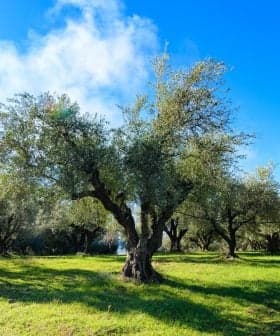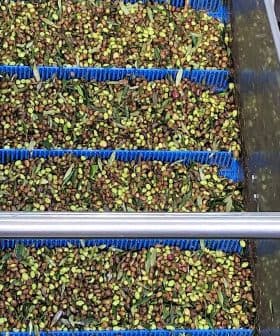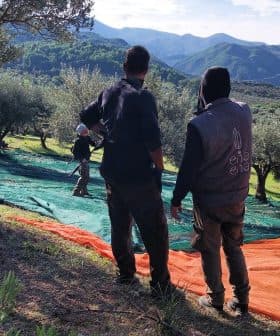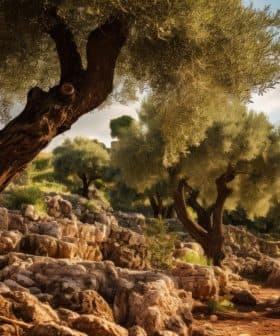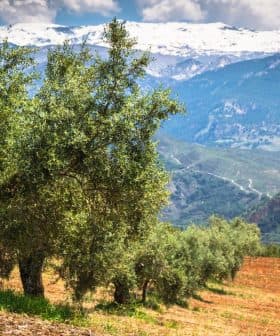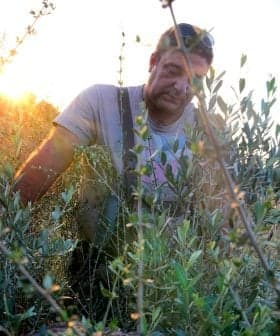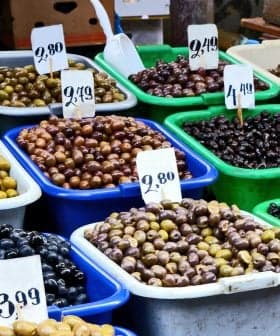Gaea CEO's Top Priority: 'Keep Serving Our Clients Every Day'
Aris Kefalogiannis, CEO of Gaea, discusses the company’s success in navigating the Greek economic crisis, emphasizing the importance of reforms in Greece, and Gaea’s commitment to the environment and the people behind their products. Gaea’s strong sales performance during the crisis is attributed to their expansion into the U.S. market, with Kefalogiannis advocating for reforms to ensure a sustainable future for Greece, regardless of whether the country remains with the euro or returns to the drachma.
Last week, Aris Kefalogiannis, the CEO of Gaea, spoke with Olive Oil Times about his company’s success in meeting the challenges of the Greek economic crisis, the urgent need for reform in Greece, some pillars of the country’s economic growth, and Gaea’s concern for the environment and for the people behind the company’s award-winning products.
We need to change our society, our economy, the way we operate.
Gaea products are exported to 26 countries, including the USA, Germany, the UK, Russia, and Norway. Along with what Gaea’s new video identifies as the most awarded Greek extra virgin olive oils in the world, which account for 50 percent of its sales, the company produces olives and other authentic Greek products. Production and exports have continued without interruption during the financial crisis, even after banks were closed and capital controls imposed, with Gaea introducing a new olive oil and olive pack line in the United States on July 13.
Kefalogiannis says Gaea is not delaying anything during the crisis: “The target is to keep serving our clients every day; this is the most important thing. We know as long as we manage to do that we will be healthy and alive as a company. Our emphasis in crisis management is to continue operating and loading our orders.” They have achieved this, with higher sales this July than any other year. It has been a struggle, given the need for advance cash payments, with a previously approved credit line not yet activated even after banks reopened. Gaea managed to pay foreign suppliers and maintain supplies by opening a bank account outside Greece.
Kefalogiannis mentions that both Greek import companies and the export companies that rely on imported materials face “tremendous problems” now, with hundreds if not thousands of loaded containers waiting in ports during the current banking crisis and economic recession. Even so, Kefalogiannis points out, many are relieved that Greece has avoided “the worst: an uncontrolled bankruptcy of the Greek state. No one could forecast accurately what that would mean.”
Kefalogiannis credits Gaea’s current success largely to the creation last March of Gaea North America, a wholly owned subsidiary of the Greek company, which is headed by David Neuman, the former CEO of Lucini Italia, and based in Hollywood, Florida. With Gaea products readily available in the U.S. thanks to a very good distribution network in the Northeast, especially in the New York metro area and with the Northeast and Mid-Atlantic divisions of Whole Foods, American imports have made a strong contribution to Gaea’s recent high sales volume.
See Also:What an Olive Oil Brand Needs to ‘Make it Big’ in the U.S.
However, if the situation is to improve in Greece more generally, Kefalogiannis is adamant about one thing: “If I have to say one word I’ll say: reforms. We need to change totally our society, our economy, the way we operate, the way the Greek state has been set up, all the bad practices, the protected professions.” He argues that such reforms will ensure “a future for Greece even if we go back to the drachma,” a reversion he is strongly against, being in favor of the euro although he admits a devalued drachma could theoretically help a company like his, which is dependent on exports for 82 percent of its business.
Whether Greece stays with the euro or returns to the drachma, Kefalogiannis cautions, “without reform, structural problems would bring the same deficits and problems, dragging things downwards.” He also argues that “austerity without reforms is a dead end.” What is most important to him is not which government is in charge, but that reforms are instituted, because he expects reform to benefit all sectors of society and help reverse the brain drain that has plagued Greece for years. “Reforms will create conditions for these talented people to come back. A lot of talented people have moved abroad and become extremely successful when they are part of an organized society.” He views their ability to thrive under different conditions as proof that reforms are needed and will help.
After reforms are instituted, Kefalogiannis suggests that “three pillars” could be central to an economic recovery: 1) the Greek diet, 2) tourism, including culinary tourism, and 3) shipping. Gaea’s video points out, “No matter how far you look into Greek history, you will see that olive oil dominates our diet. It is the basis of the Mediterranean diet, and all scientists attest to its benefits.” Featuring traditional Greek products, Gaea has been helping to introduce the traditional diet of Greece to the world, both as part of Mediterranean cuisine and in terms of its unique healthy features.
A closer link between tourism and the food industry could benefit both industries. Kefalogiannis maintains that while “culinary tourism is in its infancy in Greece,” there’s tremendous potential. “There is no more powerful tool of introducing our diet and our products to the world than by bringing people here, especially during harvests. It creates a lasting impression. The field trip is the most effective marketing and selling tool.”
While Kefalogiannis recognizes the importance of marketing, Gaea has also demonstrated an impressive concern for both human beings and the environment. The Exportleaders website indicates that the company produced the first carbon neutral olive oil and olives in the world. Kefalogiannis explained to Olive Oil Times that Gaea accomplished this by measuring carbon dioxide emissions during the life cycle of olive oil, all the way from the field to the supermarket shelf. They found that for every kilogram of conventional olive oil Gaea sold, 4.08 kilograms of carbon dioxide were emitted, and just 1.87 kilograms of carbon dioxide for organic olive oil. This is far better than tomatoes, for example, at 35 kilograms of carbon dioxide per kilogram, or beef at 70 kilograms of carbon dioxide.
Gaea wanted to calculate its carbon footprint because the company pays a fee to the Swiss foundation myclimate for every kilogram of carbon dioxide released into the atmosphere. That fee is reinvested in renewable energy resources in developing countries throughout the world. Once they learned what caused most of the carbon emissions, they could work on reducing emissions, as everyone can. Surprisingly, it was not glass bottle production or even transportation to various parts of the world that caused 70 percent of the carbon footprint of conventionally produced olive oil, but the small amount of fertilizers and pesticides used by olive farmers. That explains why organic olive oil production leads to a much lower level of carbon dioxide emission.
Along with concern about the environment, Gaea demonstrates respect for people. Kefalogiannis explains that his company supports employees who seek an education, having financed two masters’ degrees (one in the U.S.). “We encourage people to develop their skills and grow in the company. Many employees started very low in Gaea and are now working in management.”
Gaea’s attention to people’s needs extends well beyond its 52 Greek employees. Kefalogiannis says Gaea was the first olive oil company in Greece to do contractual farming with the same people year after year — both individual farmers and cooperatives. Now Gaea has an innovative long-term exclusivity arrangement with the agricultural cooperative in Kritsa, Crete: Gaea buys all they produce and gives them back 50 percent of the added value created — considerably more than producers generally get. Kefalogiannis believes in “rewarding farmers for outstanding quality” in order to attain the consistently high quality products Gaea is looking for.
In Sitia, Crete, he explains, Gaea is rewarding farmers in a different way, by trying to help save the deeply indebted Union of Agricultural Cooperatives from bankruptcy, in cooperation with the Bank of Piraeus, the union’s biggest creditor. By January 2016 at the latest, a new company that is a joint venture of Gaea and the union will begin operating, using the brand name “Sitia Olive Roots SA.” Gaea and the union will manage the company, with Gaea paying for use of the union’s modern facilities and famous, award-winning PDO brand name. Eleotechnia reports that the planned 20-year cooperation between Gaea and the Union of Sitia will rescue the bankrupt union, benefit the farmers with contractual farming, and preserve the famous Sitia name in the international olive oil marketplace, while Gaea’s management and marketing skills help the union earn enough to pay off its debts.


